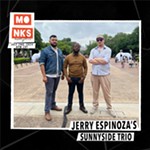Page Two: From Gutenburg to the Kindle
Oh, brave new world that has such a paper in it
By Louis Black, Fri., Oct. 7, 2011

Over three decades of publishing this paper, we have undergone such dramatic shake-ups, a number of times finding it beneficial to both readers and staff. This time it was not like we had much choice. Technological innovations, having already caused such dramatic changes in media, seem to be speeding up rather than slowing down. Nor have things yet settled enough so that the role of print media in this brave new world is established. During the last half-millennium since Johannes Gutenberg, changes in media happened at such a slow pace as to seem more stylish than profound. Now, so many of the cultural guideposts and forms of communication that many of us grew up with have disappeared or become almost unrecognizable. Although, when all is said and done, I suspect that at least many of the formalities and much of the architecture of print media, though changed, will survive. But what the hell do I know?
Here at the Chronicle, there has been a sense that this has been a clear-the-decks effort in that we have rethought and re-imagined both the print and online versions (related but distinct entities). Crucial to this whole process is the understanding that this time out the changes are not finite. It is not, "OK here's the Chronicle, maybe we'll redesign it again in five years." Instead, in this new media world, the paper has to be and will be always evolving.
The changes in technology and media have also created a significant difference in the relationship with the public – the ways they are perceived, used, and interacted with by audiences. Consequently the economics and business have changed. In a very tangible way, this has financially impacted the print media business across the board, including the Chronicle. This directly affects the paper's staff and content.
Over the years when discussing changes in the Chronicle, the focus of this column has usually been on what is new, expanded, and added. There really is very little discussion on columns that have been cut or shifts in emphasis in terms of editorial coverage. Most of the reason for that is my reluctance to begin a discussion of what is no longer in the paper.
When there is a change, a column cut or a writer leaves, it is often for complex reasons. The reason the column or writer or area of coverage appeared in the first place is because we believed in them, or obviously, they never would have been in the paper in the first place. Canceling a column or changing coverage is always a difficult and controversial task with decisions never made lightly nor quickly.
One of the paper's main goals is to serve, entertain, and inform our readers. These kinds of changes lead to awkward areas. If there had been no reaction to the recent cuts, it would have been really troublesome. Some people, feeling extremely strongly about these columns, are angered to lose them. We sympathize and ask you to bear with us.
But there are always some readers who seem convinced that something more nefarious is driving these changes. One person posted the following: "A Simple Question: why has the hightower report been slashed in half?" Obviously, the use of the term "slashed" indicates this is not really a simple question. But we acknowledge that this was one of a number of negative reactions to our decision regarding "The Hightower Report."
For many years the Chronicle ran two Hightower columns in each issue. After much thought and discussion the decision was made to only run one Hightower column in each issue. Our preference for cuts was to start with syndicated material that is available elsewhere, so this decision was made somewhat easier because all his columns are regularly posted on his website, www.jimhightower.com.
I don't want to seem too glib or nonchalant about any of this. The past year has been the hardest, most exhausting, and most painful period of time here since the very early years of the paper when our ongoing existence was by no means certain or even (at times) likely.
The changes in the paper have been many, but the most obvious ones are that we dropped two comic strips, cut back to one Hightower column, and dropped the "Car Talk" column. There have been other changes. We began stapling the issues, for example. What turned out to be the biggest surprise for me during this whole experience has been that some readers (only a very small number) complained.








